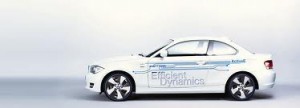The London Olympics are likely to be the best advertisement yet for the electric car.
BMW, who will be exclusively providing the vehicles for athletes, officials and VIPs, have fallen far short of the initial target of 4000 electric vehicles shuttling noiselessly and emission-free to and from the Olympic facilities.
But in this new era of diminished expectations for electric cars the new estimate that “at least” 200 of the VIP vehicles headed to London for the 2012 games will be battery-only vehicles now seems quite impressive.
The rest of the cars in the BMW fleet, many of them so-called “clean diesels”, will be technically too polluting to drive for nothing into the central London congestion charge zone (100g of CO2 per kilometre – g/km – is the limit) but as big comfortable executive cars go, they are claimed to be among the least polluting around.
And one of the new models (assuming they deploy it) comes very close to meeting the 100g figure, even though it’s a conventional petrol-driven vehicle.
The two electric cars on show will be the ActiveE (pictured) and MINI E electric cars, part of BMW’s research and development work on electrically powered vehicles (EVs). The Mini is certainly as British as German cars come, although it is very little in common with the famous mould-breaking creation Alec Issigonis designed in 1959.
This electric car is certainly tried and tested. Random drivers from among the public have been driving 600 MINI Es, providing real road knowledge about the demands on future electrically powered production vehicles. Feedback has been very positive. One of the car’s keenest advocates is the American blogger Tom Moloughney.
He wrote (http://minie250.blogspot.com/ ):
“For the past 31 months it’s been my primary vehicle and I put over 72,500 miles on it in that time. It proved to me electric cars are ready for prime time. They are fun to drive, easy to recharge and really offer a great overall driving/ownership experience.
“The MINI-E saved me about 250 trips to the gas station, and kept me from buying about 4,000 gallons of gasoline. I wasn’t constantly worried about my range like everyone that has never driven an EV says will happen and the car never left me stranded because it ran out of power. It was just like any other car, I got in it and drove.” Moloughney is now driving the latest development vehicle in BMW’s electric fleet, the ActiveE. http://activeemobility.blogspot.com/
This worldwide exposure of electric cars through these two trial vehicles should stoke interest in the company’s first purpose-built, designed from scratch, electric car, the BMW i3. It will sell for around £28k, which includes the UK government’s electric car grant. A one hour recharge at a high capacity charger provides around 80% of battery capacity. A full charge gives a range of about 105 miles.
BMW competes with Audi to be the middle manager’s car of choice. But I suspect that even an electric car bearing the company’s much-coveted badge is unlikely to tempt too many of them to give up petrol and diesel just yet, until battery range is significantly extended. (A second BMW model due out in 2013 is the BMW i8 hybrid sports car.)
The company does claim to have the lowest emission vehicles in its market sector, and the 320d EfficientDynamics Saloon (I assume that it will be in the Olympic fleet, although it’s not confirmed yet) looks very virtuous. It returns a pleasing 68.9mpg, with very impressive emissions of 109g/km of CO2, just short of qualifying for congestion charge exemption. It costs £28,080.
I suppose it’s too much to expect the company to deploy only this model, besides the electric cars, in the Olympic fleet. How much comfort do all those important people need on a 10 mile trip from their central London hotel to the Olympic Park?
Perhaps BWM will think twice before including in its team the thirsty top of the range £35,525 335i Saloon with a top speed of 155mph, fuel “economy” of 35.8mpg and emissions at a hefty 186g/km. Do the Greenest Ever Games need that?

